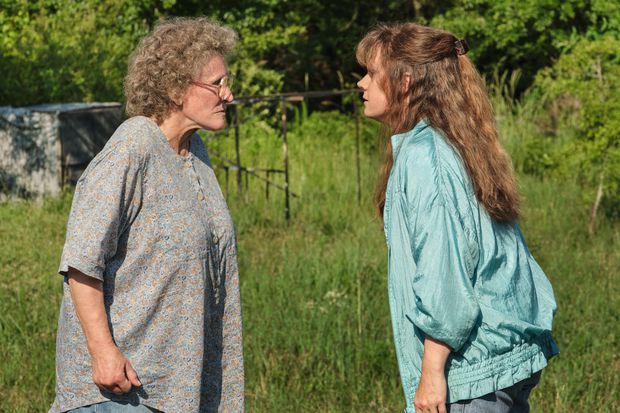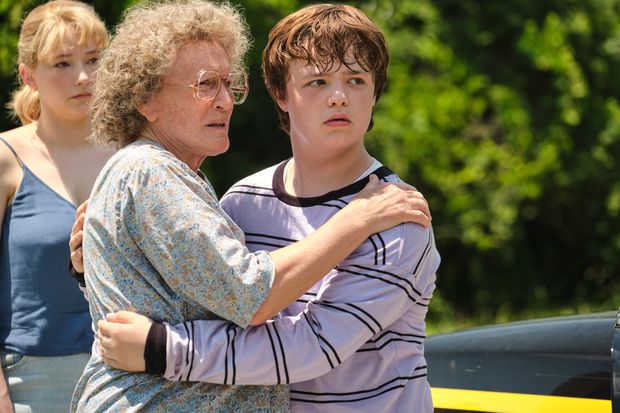
Director Ron Howard has delivered a Thanksgiving gift to America’s most-forgotten and most-maligned people—poor whites—with his solid cinematic treatment of Hillbilly Elegy, based on the best-selling memoir by J.D. Vance. The film enjoyed its Netflix debut on November 24.
While Howard and screenwriter Vanessa Taylor have taken some liberties with Vance’s material—and of necessity, left out his observations and speculations about what ails the heartland—the book’s essential survival story remains intact: a poor kid with roots deep in the Kentucky hill country manages to overcome the soul-deadening effects of continually moving from place to place with his drug-abusing mother, and a childhood without a father or father figure—unless you count his mother’s nonstop parade of drunks, addicts, abusers, whackos, and losers.
The kid—J.D. Vance, played as an adult by Gabriel Basso, and as an adolescent by Owen Asztalos, both of them excellent—survives mostly by his wits, inspired by his mean-as-hell no-nonsense chain-smoking grandmother Mamaw (Glenn Close), the counterbalance to his mother’s reliably erratic behavior. Unlike in similar stories, there are no kind-hearted coaches or teachers to intervene and help him along. Mamaw, in fact, seems to be his only guide, an unsteady one at best.

By sheer determination, young J.D. manages to overcome his family’s collective madness and the unhappy cycle of alcoholism/drug addiction/crime/jail that seems to be the fate of many of his high school classmates. He joins the Marines straight out of high school, does a stint in Iraq, completes four years of work at Ohio State University in only two, and wins admission to Yale Law School. It’s a story that would have critics leaping for new superlatives were it about a poor kid from a different background—one from a clearly oppressed minority, for example, whose against-all-odds triumphs are standard fare in film and television.
The fact that Hillbilly Elegy is about poor white people rather than poor people of color has apparently given some critics permission to be unfairly dismissive of this film. Poor white people are the last ethnic group that can be attacked with impunity, whose plight can be ignored without paroxysms of guilt. In the 2016 presidential election, Hillary Clinton sealed her fate with her characterization of such people as “a basket of deplorables.” Trump won the election the moment those words came out of her mouth. There’s nothing working-class people hate more than condescension from Ivy League elitists.
Those who disparage this film are doing so largely from Ms. Clinton’s perspective, a perspective shared by a trolling lawyer at J.D.’s first interview for a summer law internship: “rednecks,” he says without irony, categorizing an entire family and subculture.
J.D. Vance became a Yale lawyer without forgetting where he came from. Many commentators apparently have little experience of life in the rural South or in the towns of the Rust Belt, whose populations in the 1950s swelled with Southern immigrants who went north seeking opportunity.
…Poor white people are the last ethnic group that can be attacked with impunity, whose plight can be ignored without paroxysms of guilt…
The decline of such towns caused by sending industrial production offshore, compounded by the opioid crisis, is a theme examined in depth in Vance’s book, but merely implied in Howard’s film—actually all the better, as the film remains tightly focused on the personal story. In many ways, Hillbilly Elegy is a great companion piece to 2017’s The Glass Castle, with Brie Larson, Woody Harrelson, and Naomi Watts.|
For those who understand its premise and background, Hillbilly Elegy is a compelling triumph-of-the-underdog story, shot mostly in Georgia, with only a few exterior scenes actually shot in Middletown, Ohio, an appropriately-named generic town built in the shadow of an ARMCO steel plant. Taylor’s screenplay honors Vance’s book without mirroring it, and Howard’s direction is solid if a bit heavy on flashbacks and parallel flashbacks.

Haley Bennett is understatedly consistent as J.D.’s long-suffering sister Lindsay. Amy Adams is a totally believable wonder as his way-out-of-control mother Bev. Veteran actress Glenn Close disappears so far into her character that she’s initially unrecognizable. Her astounding performance alone recommends this production—one that, like the book that inspired it, is good, not great, but nonetheless important.
“Hillbilly Elegy”
- Streaming now on Netflix
- Directed by Ron Howard.
- Screenplay by Vanessa Taylor, based on the book by J.D. Vance
- Starring: Gabriel Basso, Glenn Close, Amy Adams, Haley Bennett, Owen Asztalos, Bo Hopkins
- Run Time: 1 hr 56 min
………………………………………..
Ratings:
- Overall: 3.5 of 5 stars
- Performance: 4 of 5
- Script: 4 of 5
- Cinematography: 3.5 of 5
- Score: 15/20
 ASR Executive Editor Barry Willis was born in Ashland, Kentucky, his family’s ancestral home in the coal-mining region near West Virginia. His maternal grandfather was a coal miner and worked at an ARMCO steel plant across the river in Ohio. Barry grew up mostly in small towns in Indiana and Ohio and spent fourteen years as a so-called adult in the Deep South. He is president of the SF Bay Area Theatre Critics Circle and a member of the American Theatre Critics Association.
ASR Executive Editor Barry Willis was born in Ashland, Kentucky, his family’s ancestral home in the coal-mining region near West Virginia. His maternal grandfather was a coal miner and worked at an ARMCO steel plant across the river in Ohio. Barry grew up mostly in small towns in Indiana and Ohio and spent fourteen years as a so-called adult in the Deep South. He is president of the SF Bay Area Theatre Critics Circle and a member of the American Theatre Critics Association.
-30-
